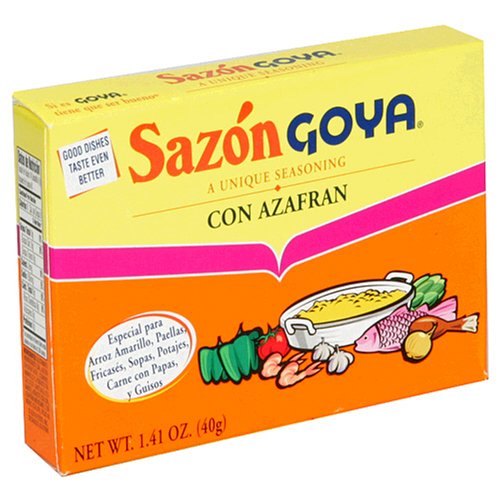 Yesterday, I got up and started to prep for my typical Sunday breakfast - homefries, fried eggs and some kind of breakfast meat. I always make my potatoes the same way - cut into chunks, boiled to soften them up a bit, cooled down with cold water and a short stay in the freezer, and then cooked stove-top with butter, oil, onions and packet of Sazón Goya (a magical little mix of spices that give the taters just enough color and flavor).
Yesterday, I got up and started to prep for my typical Sunday breakfast - homefries, fried eggs and some kind of breakfast meat. I always make my potatoes the same way - cut into chunks, boiled to soften them up a bit, cooled down with cold water and a short stay in the freezer, and then cooked stove-top with butter, oil, onions and packet of Sazón Goya (a magical little mix of spices that give the taters just enough color and flavor).But, when I reached into the box to grab the little spice packet, all I found was a whole lotta nothing! So, I decided to mix it up a bit. Instead of cooking my potatoes on the stove, I sautéed the onions quickly in some butter, then added the butter and onions to the potatoes and tossed in some paprika, garlic powder and salt and cooked them in the oven at 375 degrees until they were nice and tender (about 50 minutes). Then, to finish them off, I quickly threw them into a pan with some olive oil because they got a bit dry in the oven. They turned out pretty good but, by accident, I went a little heavy on the paprika (not my fault, the top is broken because I dropped the jar when I was unpacking... well I guess that means it technically is my fault). So, I decided to counter the over-seasoning with a nice light poached egg.
In the past, I have sort of winged my egg poaching. I knew the basics - get the water to be just-about to boil and drop the egg in with a bowl or a ladle, then cook for 2-3 minutes and scoop it out with a slotted spoon. But, I have do admit I have struggled, always thinking maybe I was leaving the eggs in for too long or that restaurants cheat with fancy-schmancy poaching machines. Instead of trying my luck, I went ahead and did my research.
To perfectly poach an egg, I found a few guidelines that really helped and I never would have figured out if I just kept at it on my own... thank god for the internet!
Here are the keys to perfect poaching:
- Use about 3 inches of water (Previously I had just filled up a pot)
- Add 1 tbsp of vinegar to the water (enables coagulation)
- Heat the water to 180 degrees (this is, probably, the most important part. Its fairly hard to determine just what it means to heat water to just under a boil. I used my beloved meat thermometer to test the temp, waiting until it hit exactly 180)
As always, you want to crack the egg into a bowl first, ease it into the water, and remove it with a slotted spoon. Then place it on a paper towel and gently wipe off the excess egg whites and water.
I cooked my eggies for just over 2 minutes and they were adorable little white puffs. I put them over a bed of the potatoes, sprinkled a bit of S&P and, as I suspected, the runny egg yolk and soft egg whites countered the over-seasoned tots perfectly!

No comments:
Post a Comment